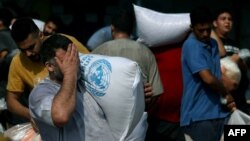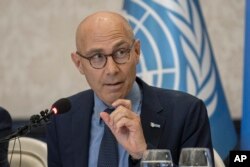Calls for peace are growing amid escalating violence between Israel and Hamas, putting the lives and well-being of millions of Palestinian civilians trapped and under siege in Gaza at risk.
“The violence needs to end, and there need to be strong efforts to seek an alternative to this carnage,” said Volker Turk, high commissioner for human rights in a statement Friday.
Turk warned that a humanitarian catastrophe was unfolding for the 2.2 million people locked inside Gaza who he said are being collectively punished.
“Collective punishment is a war crime. Israel’s collective punishment of the entire population of Gaza must immediately cease,” he said.
Israel said Saturday it will allow trucks carrying food, water and medicine to enter Gaza later in the day, indicating a possible pause in bombing, at least in the area of its border with Egypt where small amounts of aid have been arriving.
The country launched its operation against Hamas following the militant group’s deadly October 7 attack that killed some 1,400 Israelis, including children, and injured more than 5,340 others. At least 200 people were taken hostage.
The U.N. human rights chief also denounced indiscriminate attacks by Palestinian armed groups, including through the launching of unguided rockets into Israel, which he said must stop.
“They must immediately and unconditionally release all civilians who were captured and are still being held. The taking of hostages is also a war crime,” said Turk.
Jan Egeland, secretary general of the Norwegian Refugee Council, criticized world leaders for failing to live up to their responsibilities to protect civilian life on all sides.
“Leaders are not helping to break the vicious cycle, which condemns future generations of Palestinians and Israelis to yet more conflict and death,” he said in a statement.
“World leaders must immediately call for a humanitarian cease-fire to end the suffering and restart the process that can address the root causes of generations of deprivation, conflict, terror and occupation,” Egeland said, calling for an end to Israel’s “suffocating siege” of Gaza, which he indicated is endangering thousands of “innocent lives.”
Citing the Ministry of Health in Gaza, the U.N. Office for the Coordination of Humanitarian Affairs, or OCHA, reported 298 deaths in Gaza in the past 24 hours, including 125 children. Since October 7, at least 7,326 Palestinians have been killed and nearly 19,000 injured in Gaza — of whom 66% are children and women, OCHA said.
“There is no place safe in Gaza now,” said Lynn Hastings, humanitarian coordinator for the Occupied Palestinian Territory.
Speaking to journalists from Jerusalem, Hastings said nearly 630,000 of some 1.4 million displaced people have been living in schools and other shelters run for 19 consecutive days by the U.N. Relief and Works Agency for Palestine Refugees, or UNRWA.
“Gaza remains under a full electricity blackout following the Israeli halt of electricity and fuel supply to Gaza, and water as well,” she said. “The backup generators for many essential services, including hospitals and water desalination plants and food production, are one by one coming to a halt because of a lack of fuel.”
Since Israel partially lifted its siege of Gaza on October 21, 84 trucks carrying mainly food, water and medication have been allowed to enter Gaza through the Rafah Border Crossing with Egypt.
“To put things in comparison, there were 450 trucks going into Gaza every day before October 7, and that was under very strict restrictions,” Hastings said. “We do not have agreement yet with the Israelis to bring fuel in.
“We need the electricity lines to be reconnected, and I have heard the government of Israel saying they will not do that.
“We need to get the fuel trucks in, we need to get the Gaza power plant running again, and we need to do it in a secure way that offers Israel assurances to make sure that it is not going to be diverted,” she said.
The Israeli government has refused to allow fuel into the Gaza Strip, asserting that Hamas has fuel it is hoarding for use in military operations.
The World Food Program warned the catastrophic conditions facing hundreds of thousands of Palestinians in Gaza risk getting worse because of severe fuel shortages that threaten to bring food and other humanitarian operations to a standstill.
“Bakeries that have been providing bread will shut within days if fuel is not allowed in,” Samer Abdeljaber, WFP representative in Palestine, said from Jerusalem.
“People are risking their lives and queueing for hours to secure bread, and many are going back to shelters with no bread,” he said. “The notion of a warm meal is out of reach. There is no way for people to cook. In the words of one of our staff members in Gaza, the situation is like a nightmare that we cannot wake up from.”
The World Health Organization reported Saturday its health workers, patients and civilians had endured a night of intense bombardment and ground incursions in Gaza and “been subject to a total communication and electrical blackout,” adding that “WHO has not been able to communicate with its staff in Gaza, nor have other agencies.”
Richard Peeperkorn, WHO Representative for the West Bank and Gaza, reported from Jerusalem Friday that one-third of the hospitals in Gaza have shut down and two-thirds of the primary health care clinics have closed because of damage and lack of fuel.
“The acute shortage of fuel and medical supplies is putting patients at risk,” he said, emphasizing that hospitals were overwhelmed and unable to treat the many trauma and injury cases, as well as the increasing number of patients suffering from noncommunicable diseases such as diabetes, heart disease and cancer.
He said a team of seasoned WHO medical doctors in Gaza told him they were devastated by the conditions under which local medical personnel were forced to work.
“As my colleague said, the smell of death — the stench and the smell of death — is everywhere,” he said.





